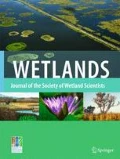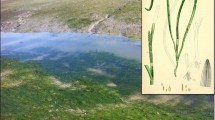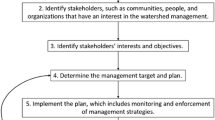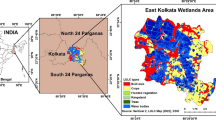Abstract
The beneficial ecosystem services provided by wetlands in Nigeria are continuously subjected to considerable stress that has consequences for human wellbeing. An understanding of the policies and legislation governing wetland can help enhance their management. Therefore, this paper reviews existing policies and legislation that affect management of wetlands in Nigeria. It draws upon the contents of the laws and policy documents acquired from government and non-governmental organizations. The paper assesses the level of attention given to wetlands and identifies some informal measures, together with 35 federal legislative acts, six international conventions, and voluntary measures relevant to wetlands management. Results indicate that the existing legislation gives little attention to wetland management. This led the authors to conclude that the reason for wetland degradation is not the lack of laws or policy documents, but weak enforcement of existing ones. In this light, the paper calls for an integration of wetland management strategies and a strict enforcement of existing laws whilst stressing that effort should target a comprehensive national wetland policy of a holistic approach.


Similar content being viewed by others
References
Acharya G, Barbier EB (2000) Valuing groundwater recharge through agricultural production in the Hadejia-Nguru wetlands in northern Nigeria. Agricultural Economics 22:247–259
Adeh I (2010) Corruption and environmental law: the case of the Niger Delta. Transaction Publishers, Berlin
Adekola O, Mitchell G (2011) The Niger Delta wetlands: threats to ecosystem services, their importance to dependent communities and possible management measures. International Journal of Biodiversity Science, Ecosystem Services & Management 7:50–68
Adekola O, Morardet S, De-Groot RS, Grelot F (2008) Economic value of provisioning services and livelihood dependence on the Ga-Mampa wetland, South Africa In: 13th IWRA World Water Congress, 1–4 September, 2008, Montpellier, France
Agrawal A (2007) Forests, governance, and sustainability: common property theory and its contributions. International Journal of the Commons 1:111–136
Agwu AE, Abah HO (2009) Attitude of farmers towards cost-sharing in the second national fadama development project (NFDP-II): the case of Kogi State of Nigeria. Journal of Agricultural Extension 13:92–106
Alagoa EJ (1971) The development of institutions in the States of the Eastern Niger Delta. The Journal of African History 12:269–278
Anadu P (1987) Wildlife conservation in Nigeria: problems and strategies. The Environmentalist 7:211–220
Anwana ED, Martin AM, Cheke A, Obireke L, Ase M, Otufu P, Otobotekere D (2010) The crocodile is our brother: conservation management of the sacred lakes of the Niger Delta, Nigeria. In: Verschuuren B, Wild R, McNeely J, Oviedo G (eds) Sacred natural sites conserving nature and culture. Earthscan Publications Ltd, London, pp 129–138
Awosika L (1995) Impacts of global climate change and sea level rise on coastal resources and energy development in Nigeria. In: Umolu JC (ed) Global climate change: impact on energy development. DAMTECH Nigeria Limited, Nigeria
Balmford AA, Bruner A, Cooper P, Costanza R, Farber S, Green RE, Jenkins M, Jefferiss P, Jessamy V, Madden J, Munro K, Myers N, Naeem S, Paavola J et al (2002) Economic reasons for conserving wild nature. Science 297:950–953
Barbier EB (2003) Upstream dams and downstream water allocation: the case of the Hadejia-Jama’ are floodplain, Northern Nigeria. Water Resources Research 39:1311
Barbier EB, Acreman M, Knowler D (1997) Economic valuation of wetlands: a guide for policy makers and planners. Ramsar Convention Bureau, Gland
Bee OJ (1990) The tropical rain forest: patterns of exploitation and trade. Singapore Journal of Tropical Geography 11:117–142
Bene C, Neiland A, Jolley T, Ovie S, Sule Q, Ladu B, Mindjimba K, Belal E, Tiotsop F, Baba M, Dara L, Zakara A, Quensiere J (2003) Inland fisheries, poverty, and rural livelihoods in the Lake Chad Basin. Journal of Asian and African Studies 38:17–51
Berkes F, Colding J, Folke C (2000) Rediscovery of traditional ecological knowledge as adaptive management. Ecological Applications 10:1251–1262
Birdlife International (2008) Community led wetland restoration in Nigeria. In: BirdLife state of the world’s birds website. http://www.birdlife.org/datazone/sowb/casestudy/36. Accessed 4 Apr 2011
Coe MT, Foley JA (2001) Human and natural impacts on the water resources of the Lake Chad basin. Journal of Geophysical Research 106:3349–3356
Constitutional Rights Projects (1999) Land, oil and human rights in the Niger Delta region. Constitutional Rights Project (CRP), Lagos
De Groot RS (2006) Function-analysis and valuation as a tool to assess land use conflicts in planning for sustainable, multi-functional landscapes. Landscape and Urban Planning 75:175–186
De Groot RS, Wilson MA, Boumans RMJ (2002) A typology for the classification, description and valuation of ecosystem functions, goods and services. Ecological Economics 41:393–408
Eaton D, Sarch MT (1997) The economic importance of wild resources in the Hadejia-Nguru Wetlands, Nigeria. International Institute for Environment and Development (IIED), London
Ebeku KSA (2004) Biodiversity conservation in Nigeria: an appraisal of the legal regime in relation to the Niger Delta area of the country. Journal of Environmental Law 16:361–375
Etkin N (2002) Local knowledge of biotic diversity and its conservation in rural Hausaland, Northern Nigeria. Economic Botany 56:73–88
Frynas JG (1999) Legal change in Africa: evidence from oil-related litigation in Nigeria. Journal of African Law 43(2):121–150
Global Environment Facility (2011) Nigeria: SPWA-BD Niger Delta biodiversity project. http://www.thegef.org/gef/sites/thegef.org/files/documents/document/Council%20document_15.pdf. Accessed 27 Sep 2011
Gophen M (2008) Lake management perspectives in arid, semi-arid, sub-tropical and tropical dry climates. In: Sengupta M, Dalwani R (eds) 12th World Lake Conference. International Lake Environment Committee, Jaipur, pp 1338–1348
Hogendon JS (1975) Economic initiative and African cash farming. In: Peter D, Lewis HG (eds) Colonialism in Africa: The economics of colonialism Vol. 4. Cambridge University Press, New York, pp 1870–1960
Hughes RH, Hughes JS (1992) A directory of African wetlands. World Conservation Union, United Nations Environment Programme and World Conservation Monitoring Centre. Gland, Switzerland
Idiogor H (2011) NOSDRA slams N1m fine on Agip. In: Vanguard Newspaper Nigeria, Lagos: Vanguard Media
Luiselli L, Politano E, Lea J (2006) Assessment of the vulnerable status of Kinixys homeana (Testudines: Testudinidae) for the IUCN Red List. Chelonian Conservation and Biology 5:130–138
Nigerian Conservation Foundation (2006) Niger Delta named most polluted ecosystem http://www.ncfnigeria.org/web/inthenews/news_feeds.php?article=21. Accessed 25 Sep 2011
Nnubia C (2008) Clean Nigeria Associates Limited: Development, Challenges And Future Of An African Oil Spill Co-Operative. In: International Oil Spill Conference, Georgia, USA. pp 1123–1129
Nwachukwu IN, Agwu N, Ezeh CI, Mbanasor JA, Onyenweaku CO, Kamalu CE (2008) Evaluation of second national fadama development project in Nigeria: a rapid policy appraisal. Munich Personal RePEc Archive, Munich
Nwilo PC, Badejo OT (2006) Impacts and management of oil spill pollution along the Nigerian coastal areas. In: Administering Marine Spaces: International Issues. International Federation of Surveyors, Fredriksberg, Denmark
Obot E (2007) Ensuring ecosystem integrity. In: National stakeholders forum on the new mechanism for environmental protection and sustainable development in Nigeria. Abuja, Nigeria
Odulari OG (2008) Crude oil and the Nigerian economic performance. Oil Gas Bus J http://www.ogbus.ru/eng/authors/Odularo/Odularo_1.pdf. Accessed 20 Mar 2011
Ogon P (2006) Land and forest resource use in the Niger Delta: issues in regulation and sustainable management. Green Governance Project, Institute of International Studies, UC, Berkeley
Okali D, Eyog-Matig O (2004) Rain forest management for wood production in West and Central Africa. A report prepared for the project Lessons Learnt on Sustainable Forest Management in Africa for The African Forest Research Network (AFORNET), Nairobi, Kenya, The Royal Swedish Academy of Agriculture and Forestry (KSLA), Stockholm, The Food and Agriculture Organisation of United Nations (FAO). Rome, Italy
Olomukoro JO, Ezemonye LIN (2007) Assessment of the macro-invertebrate fauna of rivers in southern Nigeria. African Zoology 42:1–11
Omotola JS (2007) From the OMPADEC to the NDDC: an assessment of state responses to environmental insecurity in the Niger Delta, Nigeria. Africa Today 54:73–89
Orimoogunje OOI, Oyinloye RO, Soumah M (2009) Geospatial mapping of wetlands potential in Ilesa, South-Western Nigeria FIG Working Week 2009: Surveyors Key Role in Accelerated Development Eilat, Israel
Oyatomi K, Umoru H (2009, Monday 19th January) Don’t blame Yar’Adua if he is slow - IBB Nigerian Guardian
Ramsar Convention Secretariat (2007) Wise use of wetlands: a conceptual framework for the wise use of wetlands Ramsar handbooks for the wise use of wetlands. 3rd edn. Ramsar Convention Secretariat Gland, Switzerland
Royal Dutch Shell PLc (2006) Meeting the energy challenge: The Shell Sustainability Report 2006. UK, Royal Dutch Shell plc
Sand PH (1999) Carrots without Sticks? New Financial Mechanisms for Global Environmental Agreements,” Max Planck Yearbook of United Nations Law, Vol. 3, http://www.mpil.de/shared/data/pdf/pdfmpunyb/sand_3.pdf Accessed 4 Apr 2011
Sarch MT (2001) Fishing and farming at Lake Chad: institutions for access to natural resources. Journal of Environmental Management 62:185–199
Taylor ARD, Howard GW, Begg GW (1995) Developing wetland inventories in southern Africa: a review. Plant Ecology 118:57–79
Thomas DHL, Adams WM (1999) Adapting to dams: agrarian change downstream of the Tiga Dam, Northern Nigeria. World Development 27:919–935
Uluocha N, Okeke I (2004) Implications of wetlands degradation for water resources management: lessons from Nigeria. GeoJournal 61:151–154
Umoh SG (2008) The promise of wetland farming; evidence from Nigeria. Agricultural Journal 3:107–112
World Bank (1995) Defining an environmental strategy for the Niger Delta. Nigeria, World Bank Industry and Energy Operations Division, West Central Africa Department
Acknowledgments
The first author acknowledges funding from the Commonwealth Scholarship Commission in the United Kingdom. The second and third authors acknowledge funding from the Petroleum Technology Development Fund (PTDF). We thank two anonymous referees for their valuable comments that helped improve the paper. We also thank Adedamola Ogunsesan for providing us with Fig 1.
Author information
Authors and Affiliations
Corresponding author
Rights and permissions
About this article
Cite this article
Adekola, O., Whanda, S. & Ogwu, F. Assessment of Policies and Legislation that Affect Management of Wetlands in Nigeria. Wetlands 32, 665–677 (2012). https://doi.org/10.1007/s13157-012-0299-3
Received:
Accepted:
Published:
Issue Date:
DOI: https://doi.org/10.1007/s13157-012-0299-3




